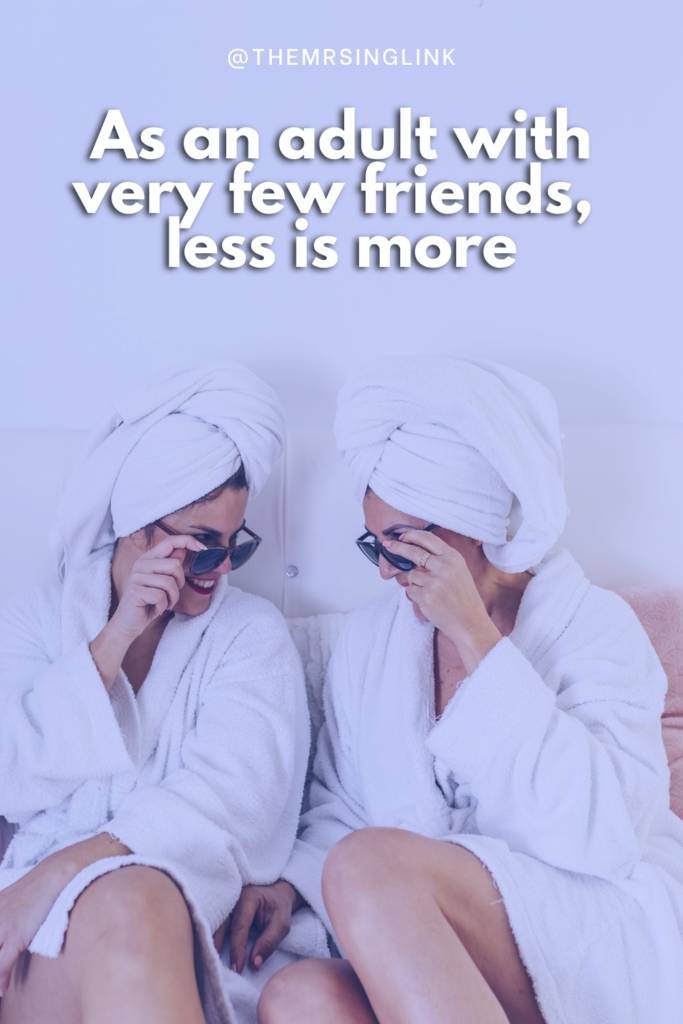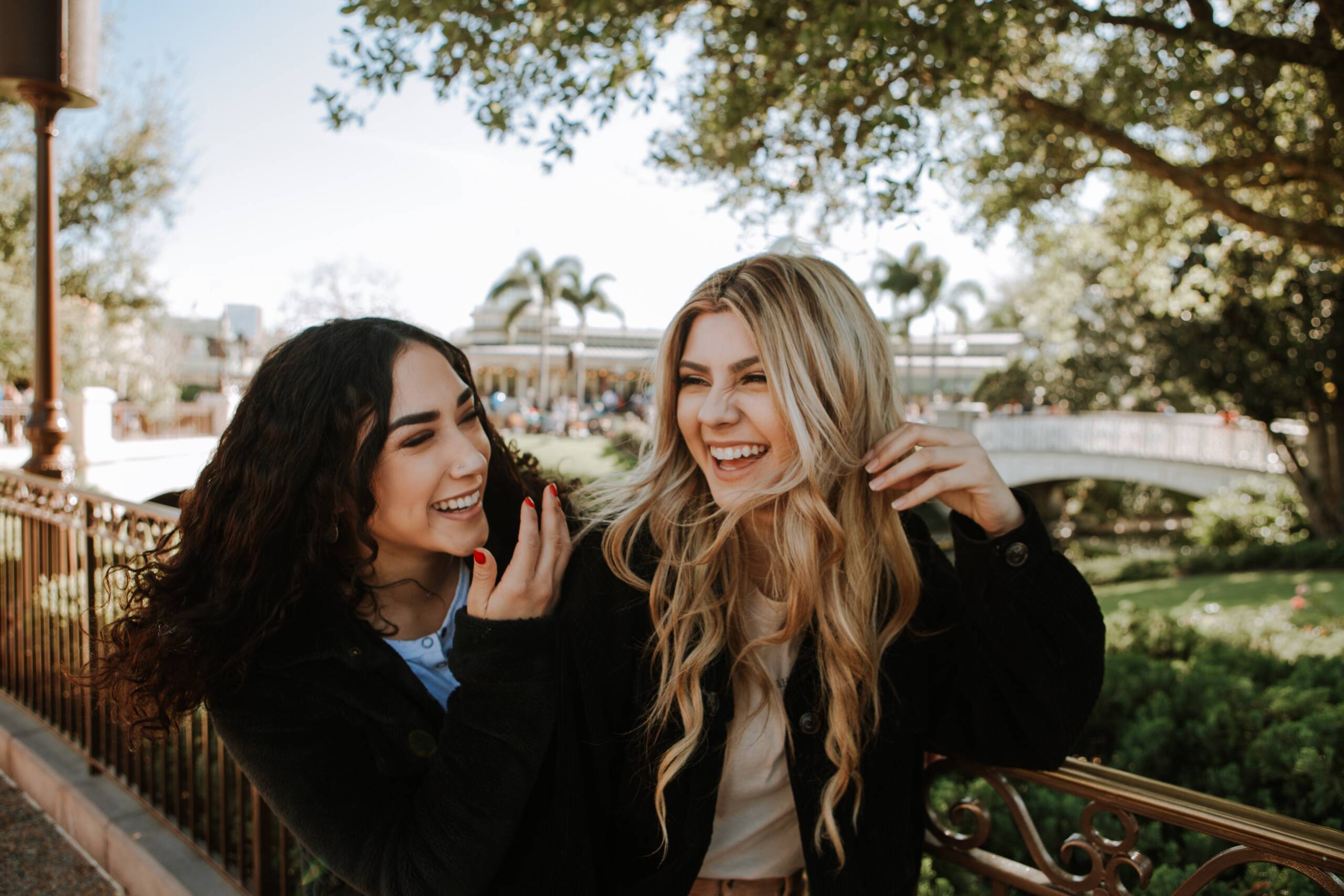I think I’m onto something with the Less is more wisdom when it comes to friendship. I’m a 30-something adult with very few friends, and quite honestly never been happier. I’ve taken away from friendship over the years that less really is more. And what do I mean by that? For one, quality over quantity. I’ve also realized that I don’t need to over-perform in order to validate the true meaning of friendship. Seriously, let’s write that one on the walls.
There was certainly a time in my life when I viewed friends as a social lifeline – the same way many view relationships. This landed me in a place surrounded by those I wasn’t proud to call my “Friends”, and ultimately I felt worse about myself and just in life in general. I guess you could say I was so over-stimulated by what I thought to be “success” in terms of friendship and a bustling social life, that I over-exhausted myself in the process.
Then one day I blinked and was drowning myself in my own sorrows – believing I had no one, or at least no one whom I felt was a genuine friend. Consequently, I ended up removing a lot of people in my life – er, more like removing myself from them – thinking this would help clear the path and I would be guided to those who I truly valued as a friend and vice versa. And when that didn’t happen, I slunk deeper into the constant draining and agony of my inner thoughts, “What’s wrong with me? What’s wrong with them?” I questioned everything I knew, and through that, I embarked on a lesson that truly opened my eyes to the meaning of friendship for the first time.

As an adult with very few friends, I’ve learned THAT less is more
Friends are no longer a necessity or an accessory
No, I am not trying to say that people are dispensable – read on. I don’t mean to sound brash, but handbags are an accessory. Water is a necessity – meaning you are entitled to it to survive, plain and simple.
Yet I was there once, in high school, where it was “cool” to have lots and lots of friends or at least to be liked by many or all. It was even common to have several groups of friends, to switch groups, or start your own. I don’t think it even mattered if you had a bad rep or people talked bad about you, for as long as you were known and remembered, there were bound to be those who find you of some “value”. Fitting in, feeling a part of something, being included, and being accepted – oh, the significance. Alas, you didn’t make it through grade school without having “friends”. And by making it I mean survive [emotionally and socially] on all fronts.
Honestly, I look back on much of my “Friendships” in and throughout high school and most of them was, I hate to even admit this, collateral for that survival. Actually, scratch that, the collateral was me – the real, unapologetic me. That’s who I sacrificed, left at home, and locked behind closed doors in order to survive – to make “friends”, to be accepted, and to feel “included”.
These friends were not and were never going to be the embodiment of true friendship. Though, of course, I didn’t know or think that at the time. And it’s not like I didn’t have friends I genuinely cared about or liked. I was rather heartbroken by the friendships I valued that, in the end, ceased once grade school was over. But at the time, I didn’t know what it meant to have real friends – how could I? So I carried this over to college, in the workplace, and into my adult life. Many of us do.
It took me a long time to learn, and accept, that friendship – real, genuine, friendship – is a privilege, not a necessity. And, sadly, high school has proven that for me. The main difference? Well, you treat them differently. When a friendship is a necessity, you either resort to abandoning yourself (your needs, boundaries, who you are) or using others (to “find” yourself, to meet your needs, to your own advantage)…without even knowing or realizing it. And, yes, we all use others, so there’s no room for denial there.
But when a friendship is a privilege, there’s no sense of entitlement. It becomes less “I deserve this” and more “I want this“. And when I want it, I value it more, for other reasons than for myself. There’s more meaning there. And I can easily say that many people who have come and gone in my life have simply been for a “need”, which is usually temporary. Yup, sounds pretty selfish. But, seriously, most friendships are these days. You’ve probably heard the phrase, “friendships are like seasons – some come and go for a reason, maybe only for a season, some hibernate for the winter, and some weather out the storms with you.” And we’re encouraged to see and learn the value in those that stay because those are the ones who are with you in your individual seasons of change. And that’s a freakin’ privilege, which brings me to my next point that..
Friendship “seasons” are normal
What is a “season” exactly? Think about it. We all go through stuff in our lives. We’re not always going to be on the same plane or wavelength as others, especially friends. For instance, you are now married while your friend is still single. Your priorities involve more than one person, and your time is now focused elsewhere, while your single friend continues spending their time the way they do. This doesn’t doom the friendship, but it does and can change it. Whether seasons are adaptable is the bigger question, and not every season will be – at least not to each individual’s liking. And that’s okay, too. Again, say you move out of state for a job, leaving your friendship limited to texts and phone calls now and then. This either strengthens the friendship on a different level or it doesn’t. And say, in the end, you move back – if the friendship survives you will pick up right where you left off.
We forget that many friendships often drift due to the simple fact of seasons. Instead, we resort to labeling the “falling out” of friendships too leniently and loosely. “My friend had a baby (less time together) – we no longer work together (nothing in common), they started a new job (too busy), are dealing with depression/anxiety (too much negativity), lost a family member (too much discomfort), went through a tragedy (I can’t help them when I have my own problems), got a new boyfriend (I’m not the priority), started a new diet fad (too inconvenient), found religion/became religious (just, ew, no), switched political views (they’re not who I thought they were)..“, blah, blah, blah, then ending with, “…it changed them. It changed us. We’re not the same friends anymore.” And maybe so, but listen, I don’t think we really take the time to sit with our presumptions and ask ourselves, “Does this REALLY mean we’re not friends, or is the circumstance triggering something [in me] that I need to reflect on, acknowledge or address?” Either way, it’s plainly unrealistic to expect a friendship to remain a constant or unchanged for as long as you experience your own seasons [changes] in life.
And how is less more? Expect less, accept more.
I can focus on getting to know the person
You know, for more than the aspects I like, that benefits me, but for the actual person. The person beyond a so-called “Definition” (of a friend). Because having a friend is more than a good time, I hope. We all want that friend who is likable, agreeable, tolerable (good vibes, easy-going, “no worries” type), accepting, understanding, caring, giving, timely, respectful, well-mannered, and the like. Of course we do, but are we, ourselves, always that way? Um, no. I know for a fact I am not always agreeable, tolerable, timely, or as accepting and caring as I COULD and SHOULD be. I also know what it’s like to fake it til you make it, “go along to get along“, or to hide how I really feel and what I really think in order to keep the peace. And when I am that person, friends don’t get to know the real me at all, which wasn’t always going to be this perfect [ideal] vision of a friend, or person, in their eyes.
It’s only in my adulthood, after having lost and let go of adolescent friendships, that I learned a genuine connection is only capable and sustainable for as long as both individuals are willing to face the parts that are hard, difficult, and uncomfortable. *Truthfully, the aspects that have nothing to do with or serve friendship at all. Now I didn’t necessarily say we are to tolerate, but to acknowledge or seek to understand. So it really is a matter of getting to know someone not for what they “bring to the table” *in friendship*, but valuing them as their own individual, including the parts that aren’t as desirable or make us uncomfortable.
[mailerlite_form form_id=23]That being said, I do think we have the strongest difficulty facing, let alone truly accepting [incompatible] differences in others – period. So into entering my adult years, after friendships ended, the number of friends I actually only knew on the surface smacked me straight in the face. Mainly because the surface is just so sweet, soft, complacent, safe, and comfortable – going beyond the surface meant I would have to face uncertainty, hard truths, scrutiny, opposition, insecurity, disappointment, and the likelihood of my fragile, wounded ego. You could say friendships ended simply because of what I learned about them on or beyond the surface, while others had such tough, impenetrable exteriors. Sometimes I feel the easiest answer is that we just expect more of others than we are willing to accept about them. And for many, that is a harsh reality too much to bear, including myself.
So in the case of less is more, how so? Well, as an adult with fewer friends, I’ve spent more time getting to know who I am – learning to juggle self-acceptance, compassion, and forgiveness, and that others deserve similar grace. Though this whole “me, me, me” journey really has nothing to do with others, it is certainly not the be-all-end-all. Unfortunately, we are partaking in this so-called movement that is all about “empathy, love, and light” that actually pushes “me, me, me“, and it’s taking us down a very broad, self-absorbing path. And in friendship, there’s too much focus on the self, and less on others.
At the very least, I can [hopefully] offer what I gained and learned to others (my friends). And by getting to know each of them more deeply and uniquely, on a level beyond the surface, I can see them as a person (for who they are outside of friendship) rather than leaning on what they can provide [for me] or who I want [hope] them to be.





